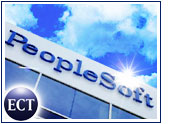
In January 2003, 52 percent of respondents to an Aberdeen Group survey said they would consider using on-demand CRM services. By June 2003, the proportion of respondents who said they would consider such services had jumped to 85 percent.
Why the sudden infatuation with hosted CRM? The most obvious reason is its cost relative to the traditional on-premise solutions sold by companies like PeopleSoft and Siebel (though Siebel now has partnered with IBM to move into the hosted arena as well). Aberdeen vice president and director of CRM research Denis Pombriant told CRM Buyer that setup costs for hosted CRM solutions approach zero.
“It’s one of the big selling points,” he said. “You can be up and running today for peanuts.”
Fits All Sizes
Even an improving economy and the concomitant loosening of IT purse strings have not slowed interest in on-demand CRM services. Moreover, interest in hosted solutions is not limited to small- and medium-size businesses (SMBs). Pombriant said that in the last few months, the functionality of on-demand systems has begun to rival that of on-premise solutions, including the ability to customize applications.
Tien Tzuo, senior vice president and chief marketing officer at hosted CRM services leader Salesforce.com, told CRM Buyer that organizations initially may choose Salesforce.com’s services because of cost savings, but then stick with it because it makes them more nimble and agile than if they had saddled themselves with an on-premise solution.
“We do not see this interest being limited to small companies,” Tzuo added. “You don’t say, ‘Banks are good for average people, but big companies like GE need to put money under their own mattresses.’ That just is not the case.”
He said Salesforce.com believes software requires a lot of investment to build but should be free to deliver. The Internet provides the infrastructure needed to offer free delivery, and a business model is born.
Ease of Implementation
Greg Gianforte, CEO of RightNow Technologies, identified cost and speed of implementation as the two primary drivers for growth in the market for on-demand CRM.
“With on-demand, not only do you eliminate infrastructure cost, you cut out most of those IT headaches,” Gianforte told CRM Buyer.
For example, Pombriant noted that if an organization takes the hosted CRM route, the assumption is that a network with T1 or T3 access to the Internet is already in place. In that case, the organization does not have to set up and configure hardware to implement the CRM system. Those in charge of obtaining the hosted service simply can go online and make a credit card purchase.
Organizations still face setup decisions, such as which business processes to support or which third-party applications behind the firewall will be integrated with the hosted service, Pombriant said. However, they do not need to install a dedicated server, a server operating system, a database or routers, nor do they have to contend with the problems that come with deploying such an infrastructure.
Increasing Functionality
Pombriant added that despite advances made in the last several months, hosted CRM functionality has not reached the depth in business processes that traditional on-premise systems have, though he supposes improving such functionality is “on everybody’s drawing board.”
In a recent white paper, Pombriant wrote: “For hosted CRM to continue making strides, the solution set needs to become richer, not simply by adding modules but by embedding functionality, such as workflow and analytics, so that CRM can deliver on the promise of managing the relationship instead of simply managing the customer.”
Of course, developing a specialty can help a company provide richer offerings in that area. Gianforte said RightNow’s primary focus is customer service because in traditional enterprise CRM models, the customer-service component typically makes up the largest portion by far of the three CRM components, which also include sales force automation (SFA) and marketing.
As a result, RightNow champions a multichannel customer support platform, which incorporates the Web, e-mail, chat, phone and interactive voice response (IVR). Forrester Research vice president and CRM research leader Erin Kinikin wrote in a recent Giga “IdeaByte” that RightNow “leads hosted service innovation for both agents and customer-facing deployments.”
Customization Options
Increasingly, hosted CRM vendors are providing customization options, allowing customers to integrate CRM services more easily with existing network setups, Pombriant said.
For example, NetSuite’s templated applications focus on vertical markets. This approach allows resellers to develop specific application sets for, say, discrete manufacturing that can be customized precisely to end-users’ specifications.
Meanwhile, Salesforce.com is inviting software developers to use its sforce 2.0 offering to construct new applications that can be hosted by Salesforce.com, Pombriant said. These applications do not even have to be CRM-related.
Tzuo said businesses can extend Salesforce.com’s service with their own applications because his company takes advantage of such protocols as .NET, XML and SOAP to provide easy integration points. As an example, Salesforce.com supplies plug-ins for Microsoft Office so that Office applications can pull Salesforce.com-generated data for use in mail merges, spreadsheets and inbound e-mails — and users can update real-time data with just a click.
Transition Phase
What’s next for hosted CRM? According to Pombriant, the market has entered a transition phase, in which some companies will emerge as successful leaders, others will be acquired, and still others will disappear, only to be replaced by higher-profile companies like Siebel, PeopleSoft and SAP.
Whatever happens, Gianforte said, the hosted CRM model is a “disruptive innovation” that will render traditional enterprise software models obsolete.
Tzuo also believes all software will migrate to an on-demand model.
“There’s a classic adoption curve going on in all areas of software, not just in what we’re doing,” Tzuo said. “Before, we had to evangelize it. Now, people are becoming well disposed to the idea.”


















































